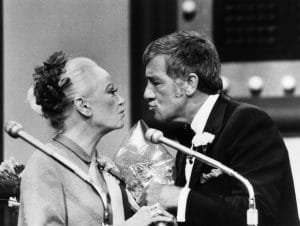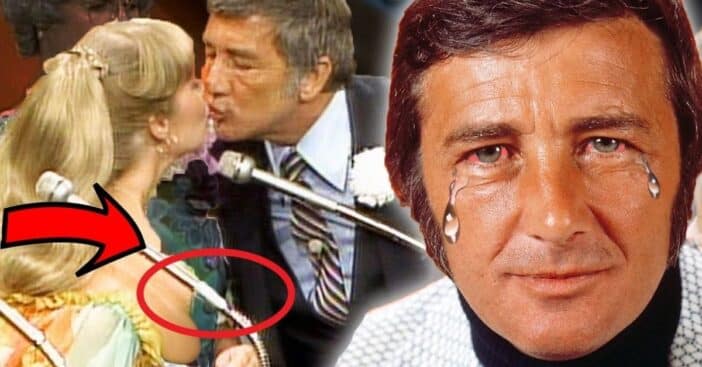
Name one of the most powerful feelings on the planet. Survey says: nostalgia! Few shows are such a unique source of this feeling than one of America’s most formative game shows, Family Feud, made especially unique during its years under Richard Dawson’s tenure. In those days, contestants didn’t just have to think fast on their feet; they might have to pucker up too from a patented Dawson kiss. This practice managed to standout in an already famous gameshow career – but just what was the story behind it? And what went on behind the scenes as a result?
To answer these, it’s time to revisit Family Feud under Corporal Newkirk himself, Richard Dawson. The program itself has cemented its legacy in America’s rising gameshow fervor and managed to stick around to this day, now under the reign of Steve Harvey. How did we get here and what was Dawson’s role in it all? Those questions and more will be answered with a trip down memory lane – and to the scoreboard.
Let’s Match a Feud
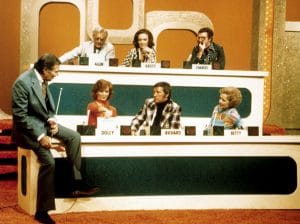
The latter half of the twentieth century saw game shows finding their feet. The list of options was steadily growing when, in the 1950s, a scandal erupted among quiz shows, which made viewers skeptical and wary of early competitive programs. The scandal was basically a revelation that the supposed unscripted nature of these programs was actually predetermined, destroying the illusion of surprise. But in the end, that just left room for the true champions to spread their wings. Panel shows enjoyed newfound success when they took a comedic approach and the leader of the pack was Match Game, from Mark Goodson/Bill Todman Productions.
RELATED: ‘Hogan’s Heroes’ Cast Then And Now 2021
It grew so popular that producer Mark Goodson devised a spinoff. Survey says that the next show became Family Feud, pitting two batches of contestants against one another to see who could guess the most popular answers from a poll of a hundred people. But there was another important piece of the equation to figure out, most notably the host. Goodson had an answer for that too, thanks again to Match Game.
A fine selection
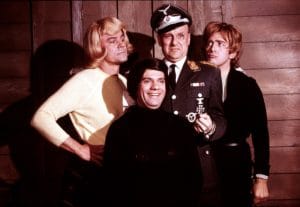
Match Game relied on the chemistry of its celebrity panelists, which offered a pool of established and rising icons. The very first lineup included heavy hitters like Michael Landon, Vicki Lawrence, and Jack Klugman, with its very first regular panelist being Richard Dawson himself. By this point, Dawson had six years of Hogan’s Heroes under his belt, where he snuck and conned his way through danger and right into people’s hearts.
And so when the next Goodson–Todman project began, Dawson wanted to audition for the host job. This actually disrupted Goodson’s plans, as he was looking at William Shatner or Jack Narz for the gig. When Dawson heard that, he set an ultimatum: let him host, or for the rest of his time on Match Game, he would become the most boring, unlikable guy imaginable. Dawson was that show’s strongest participant; this sabotage could bring its early end. Goodson heard Dawson’s message loud and clear and recruited him as host.
Name the biggest factors for success
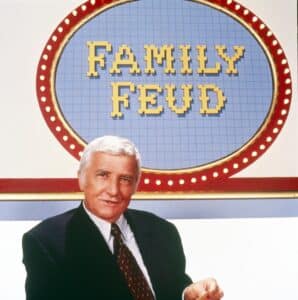
Game shows need a lot of variables to align to enjoy success. And aside from the format, the host has to bring some chemistry to the table. That’s where Dawson tapped into his past work.
Beginning in 1976, people tuned in for Dawson’s quick wit that he honed on Match Game and paired with his familiar dryness from Hogan’s Heroes. But he did something else that’s different – without even referring to the kissing yet. In this case, it was his style. Current Family Feud host Steve Harvey will hear a silly answer and unabashedly share his thoughts on it, verbally obliterating whoever spoke. That’s his style.
But Dawson did things a little differently. He saw even the outrageous answers as perfectly befitting the show, even saying they made sense to him. He once explained, “Usually, I say ‘good answer,’ in a sarcastic way. ‘Name a vegetable you have to peel to eat.’ They’d say grape, and I‘d say ‘good answer.’ Dawson had grace and style, and made Family Feud a household favorite.
Question Selection
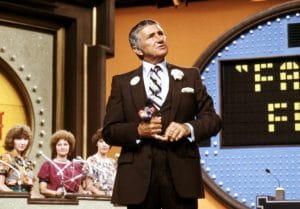
What would Family Feud be without its surveys? Probably just two families standing around, hoping for a car. The questions are more or less timeless and relatable, while also being topical. But how did the show figure out what answers were most popular?
Back in the day, Family Feud used a mailing list. Their go-to polling firm is called Applied Research-West, which these days randomly calls people asking survey questions. But the catch is people aren’t told it’s for Family Feud. Do you think you’ve shared an answer that ended up on the board? Let us know in the comments. It’s also worth noting that while Family Feud provides a lot of answers, it is not a trivia show the same way Jeopardy! is. These are not facts; rather, they are the most frequent replies the pollsters received.
As for the early days of questions, the very first prompt ever used: Name a famous George. This first prompt had the top answer of the first president: George Washington. A lot of these survey questions enjoyed a second life on Card Sharks. But the game show crossovers didn’t stop there. The Family Feud theme, fittingly called “The Feud,” was actually part of the music package for The Price is Right, remixed with some banjos added in.
Lollipop, lollipop
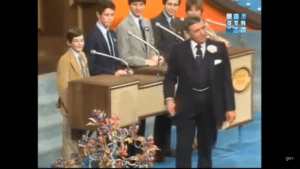
Dawson left his mark in another way – no, still not the kissing, though maybe it was related. He was famously a huge fan of the classic sweets, lollipops, and even gave them away to people as a simple kindness. This ended up making its way into the show. Look closely during episodes from ’83 to ’85 and you’ll see colorful Tootsie Pop trees on the podiums near each competing family. And if you’ll recall, a family member, usually the youngest, would pull a lollipop. If it had a black stem, they got an extra $100.
This was a nice bonus for competitors, but almost more importantly, this revealed a kinder side to Dawson not everyone got to see. Contestants saw his host persona and producers saw a rather demanding side that knew his worth. It was refreshing for everyone to see him soften up when he gave out treats at the end of a game.
The Kissing Bandit
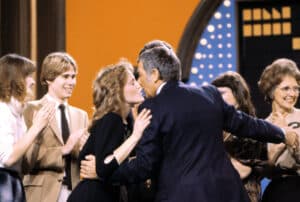
Family Feud was just weeks into its first season when a young woman competing was struggling to name a green vegetable. As Dawson tells it, he saw she was shaking from feeling so nervous. First, he tried holding her hand and shrugging off the pressure by saying, “It’s not open-heart surgery.”
That didn’t work. So, he took a page from his mother’s handbook. When his mother saw a child or loved one was visibly nervous, she would often give them a kiss on the cheek. That’s exactly what he did, throwing in, “That’s for luck.” As the story goes, the next second, she answered “Asparagus.” So began the reign of the Kissing Bandit, as Dawson became known, since from then on he decided to kiss all the female contestants; when the next contestant actually asked for one too, it became a trend for, as he put it, “love and luck.”
Dawson ended up sharing his first kiss with his future wife on that very show. In 1981, a woman named Gretchen Johnson competed and won over $12,000. Dawson gave her a peck and ten years later, they were married. Romantic? Some would strongly disagree.
Smooching survey says
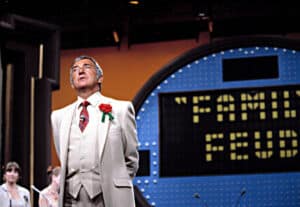
Without a doubt, times are very different from the ‘70s to today, but even then, the Kissing Bandit caused a bit of a stir. There was some protest. ABC was also bothered by this bold move Dawson pulled again and again and finally asked him to stop, Up to this point, Dawson has shown how much he likes setting his own roles, though, and this decision was no different. He refused to stop, and then suggested they do what Family Feud does best: conduct a survey. Viewers were asked if they thought he should keep on kissing or put a metaphorical lid on it. Producer Howard Felsher lost track of the exact numbers but put it at approximately 14,000 in favor of kissing and a couple hundred against.
Part of the problem, besides the whole kissing-random-ladies-without-invitation, was also the prejudices of the time. Apparently, Dawson received backlash when he kissed people of different races. But Dawson refused to discriminate who kissed, again thanks to his mother. When the English-born host was surprised, years before by seeing so much diversity, his mother said to him “God makes people. You understand that, don’t you?” When he answered affirmatively, she then asked who makes rainbows. He answered “God.” To this, his mother said “I never presumed to tell anyone who could make a rainbow what color to make children.”
The kissing ultimately stopped when Dawson returned to the show in the ’90s, but it wasn’t corporations or network executives who stopped him. It was something far more powerful: the will of his daughter. Dawson promised he would only kiss his wife from then on.
Money talks
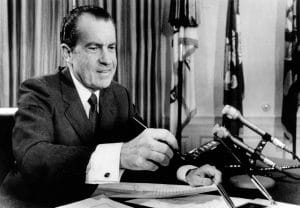
Gameshows put a lot of pressure on their hosts and Dawson often went to topical humor like a quick Richard Nixon joke. One sponsor approached ABC requesting those particular quips to stop. The network’s first solution was to edit Dawson’s comments out. But he threatened to quit if they cut his jokes. He said he knew advertisers and they’d sponsor war criminals as long as they could push the product. Dawson told them to stop sponsoring if they didn’t like it.
Dawson had a tendency to be very vocal when he had thoughts on a subject. He had an ongoing rivalry with producer Howard Felsher, raised a lot of noise about faulty electronics, and often made the program run long because of his stories. This cost the production money and always put a strain on working relationships.
The End, Part 1
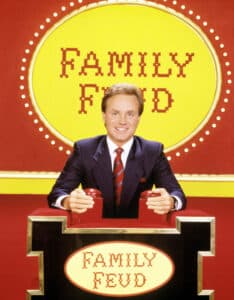
For nearly a decade, Family Feud enjoyed the top of the game show food chain until 1984 when Americans wanted to buy a vowel and Pat Sajak became the new face of competitive TV on Wheel of Fortune. Ratings began to wane and backs began to break; Family Feud ran a tight shift, taping all five weeknight shows within a single day of work. Dawson had an almost hourly sprint between the ABC studio and his dressing room to prepare for the next session. He voiced his complaints and ABC ultimately called it quits.
For a while, anyway. Just three years, actually, next with CBS and Ray Combs at the helm. But ratings struggled again, and against many staff wishes, network execs approached Dawson with a contract of $2,000,000 a year.
Maybe it was the seven digits of money, but Dawson was excited about working on Feud again, and even swore he’d lose the retirement weight. His excitement was contagious and ABC made deals with dozens of stations ready for his return. In the end, Dawson only prolonged the inevitable for one season before reverting to full retirement, and the show slipped into brief obscurity once again. Of course, that doesn’t last either.
The legacy of Richard Dawson and ‘Family Feud’
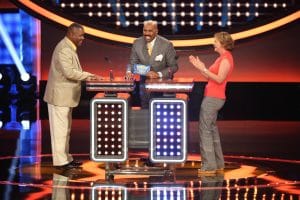
Family Feud has cemented its place in TV history beyond debate. Within just a year of its inception, Family Feud became the number one game show on daytime television. Today, it’s now one of the top three most popular syndicated programs in America. That is before counting the international versions, of which there are more than fifty.
Producer Goodson credits the excellent hosts. Dawson was unafraid of getting his hands dirty, even admitting he’d get argumentative with contestants so they’d talk to him unfiltered on national TV in a sort of “I’ll show you!” attitude.
Dawson was divisive even at the best of times. Just one man could get people cheering on their feet and ripping their hair out in frustration. For example, in the show’s final episode, he was allotted some time to give a speech, and it was very sentimental, the kind any fan wants a beloved program to end on, sharing sweet memories, thanking the staff – including his nemesis Howard Felsher. But then the next day Dawson wanted all of that stricken from the record.
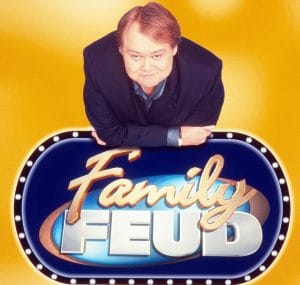
But there’s no taking back what the show meant to people, including Dawson, who said, “I’ve had the most incredible luck in my career. I’ve done lots and lots of jobs, and I’ve never, ever had a job like Family Feud. I’ve never dreamed I would ever have a job where so many people could touch me and I could touch them.” It’s assumed he only meant figuratively.
Over 1,200 episodes and 20,000 kisses later, viewers are still shouting their most ridiculous guesses at a giant scoreboard, hoping not to see that infamous red X. Who was your favorite host? Though this focused on Dawson’s legacy, it doesn’t even include the powerful Louie Andersons’ short tenure from ’99 to 2002. He was great also. What are some of the funniest answers given on the show Get in the comments below and let us know!
